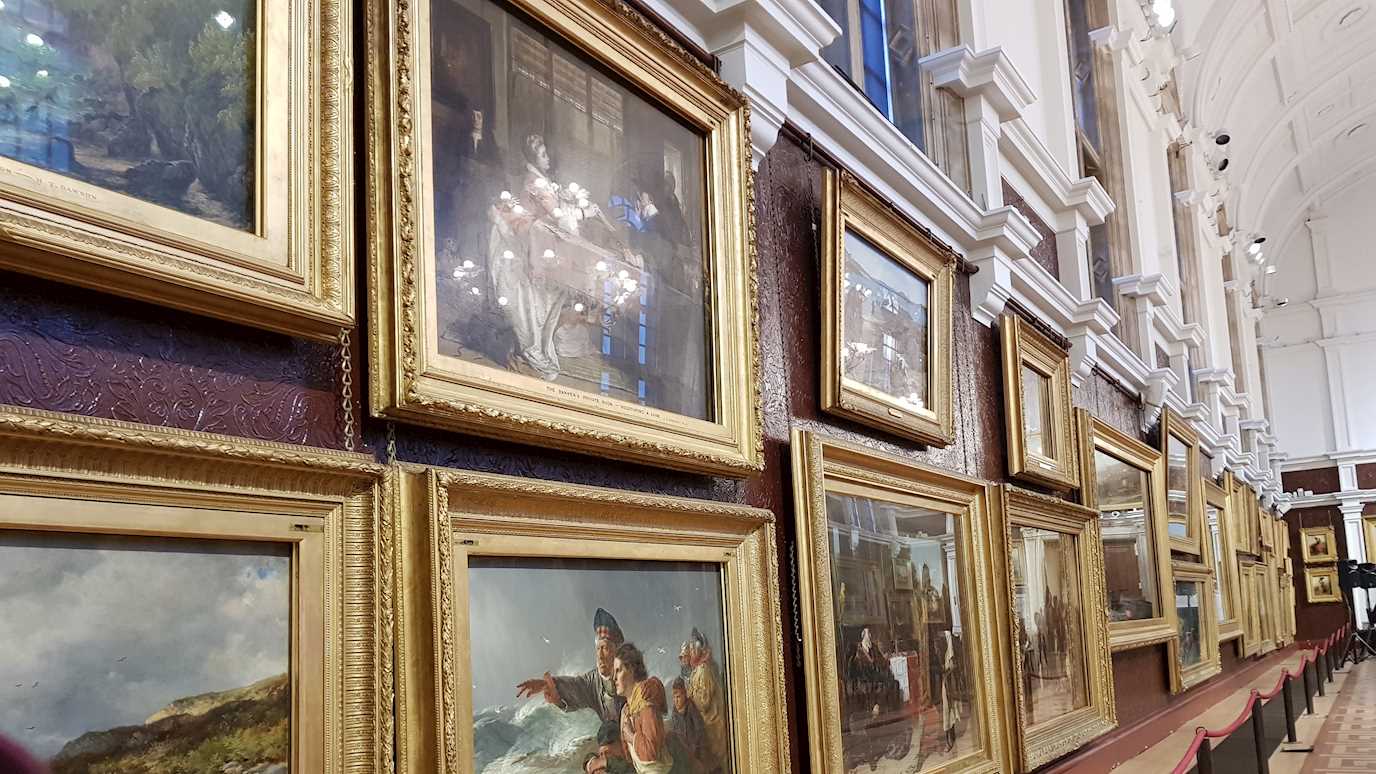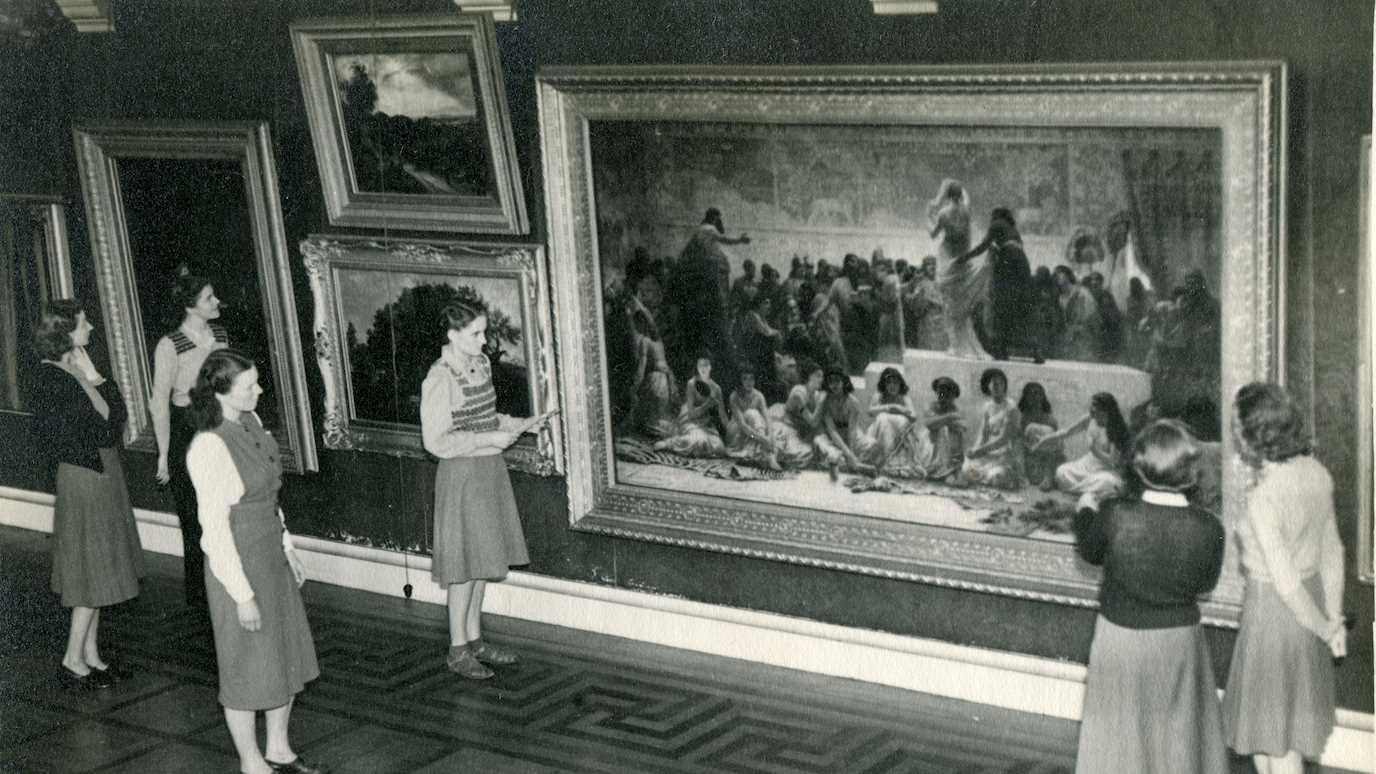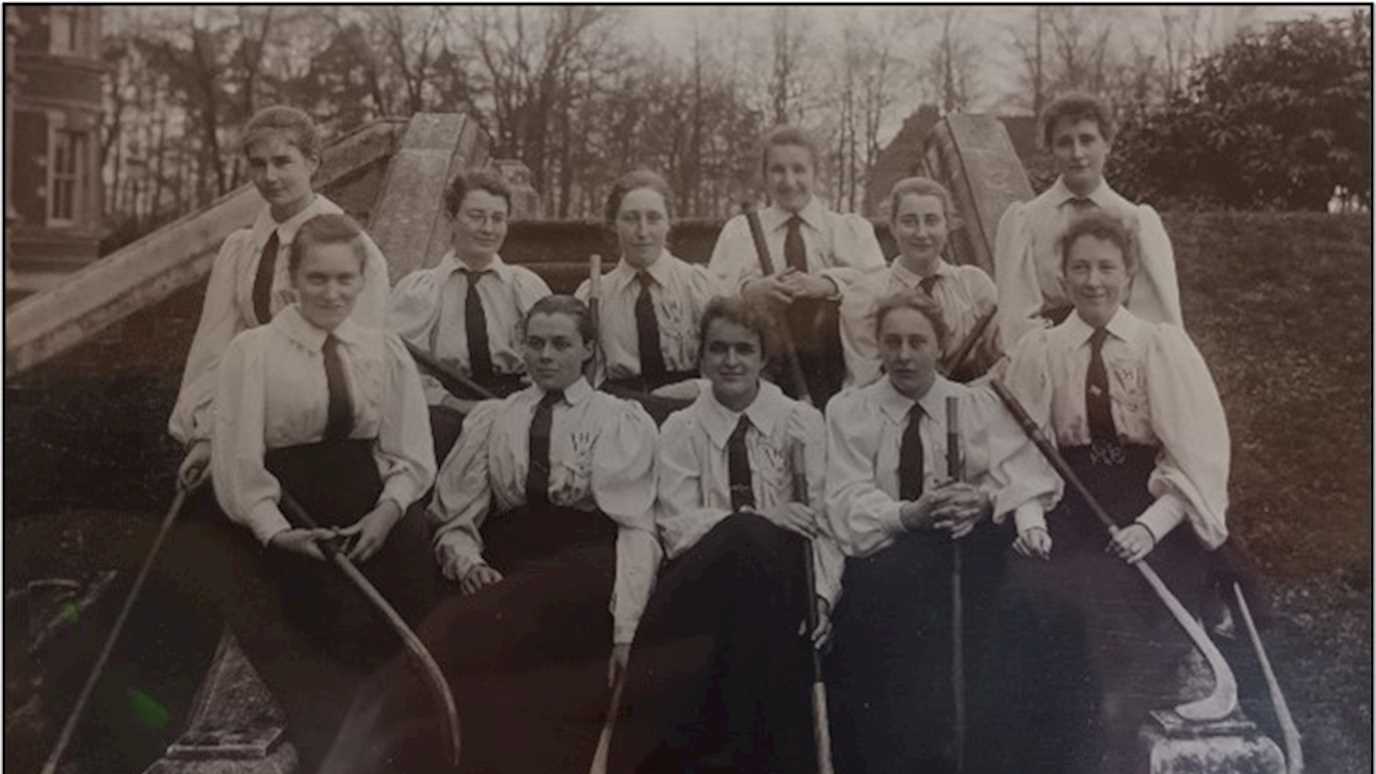Writer, suffragist, abolitionist, and the first female ‘Visitor of the College’ at Bedford College for Women.
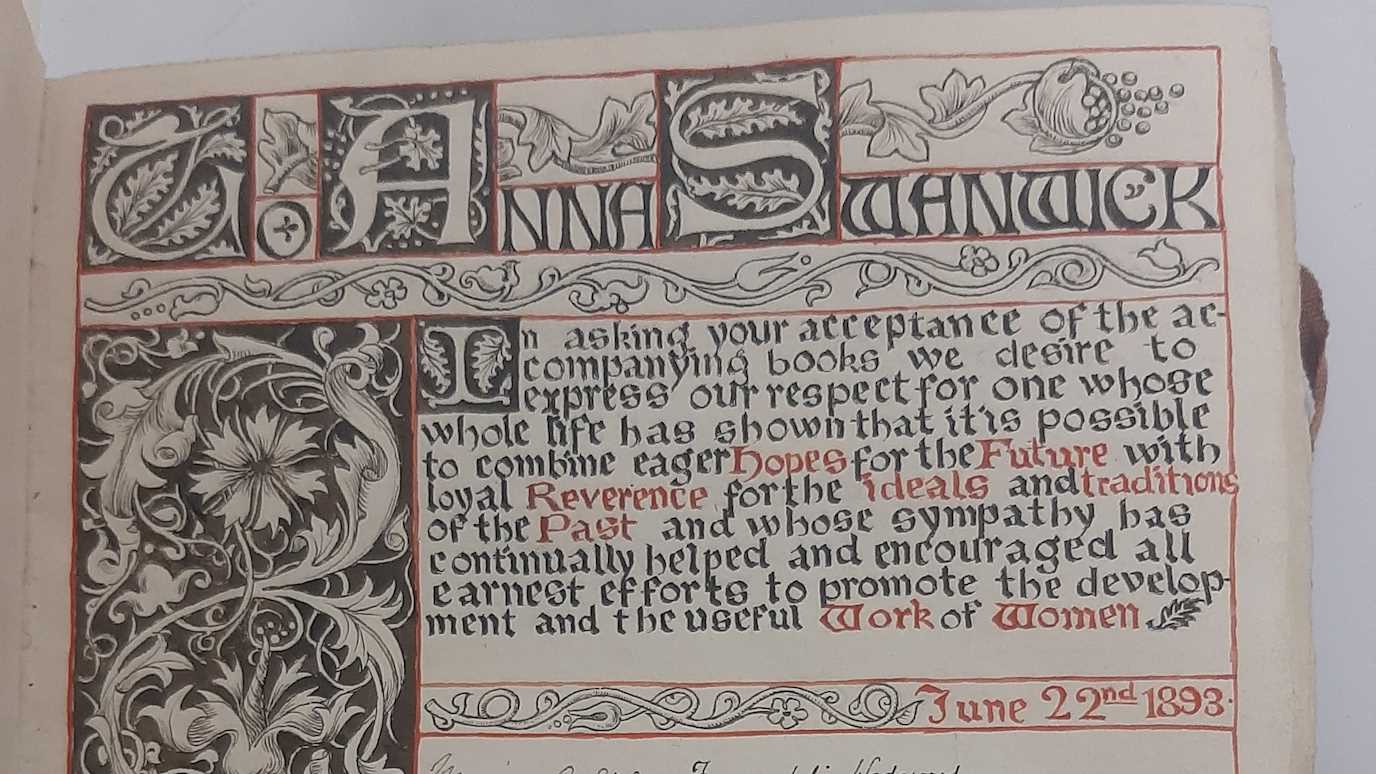
To a modern community at Royal Holloway, Anna Swanwick’s name may not be as instantly recognisable as that of Elizabeth Jesser Reid, founder of Bedford College for Women. By tracing her story, this article aims to affirm Anna Swanwick’s legacy as a tireless champion for women’s education.
Swanwick’s keen awareness of the link between education and political enfranchisement for women was enacted through her enduring support towards these causes during her lifetime. Since 1899, the year of her passing, the following quotation by Anna Swanwick has been consistently invoked in tributes and articles about her life:
“Give [women] a sound, practical education, remove their social and political disabilities, and in their energy and sympathy, conscientiousness and tenderness we shall, I believe, have a reservoir of power which will lift this great nation to a higher level of social and political life.” (Anna Swanwick, 1873, quoted in Bruce, 1903:163).
The act of remembering these words for over 100 years is surely a testament to the feats of Swanwick’s philanthropy and the strength of her character. To unearth the details of Anna Swanwick’s life, scholarship, and dedication to the causes of abolition, women’s suffrage, and women’s education, the author draws upon various resources kept within Royal Holloway’s Archives and Special Collections. Amongst these materials we discover a formidable figure.
Early Years (1813-1839)
True to Anna Swanwick’s modest nature, she expressed a wish to not have her private correspondence published (Bruce, 1903, preface); nor did she keep any diaries. Details about Anna Swanwick early years and personal life are drawn from a memoir written by Swanwick’s devoted niece, Mary L. Bruce.
Born to a wealthy family in Liverpool in 1813, Anna Swanwick was a child during a period of political upheaval in England in the wake of the Napoleonic Wars. From the Peterloo Massacre of 1819 to the passing of the Great Reform Act in 1832 and the Chartist Movement, the early 1800s in England were marked by agitation against an unrepresentative electoral system, and a desire amongst the working class to improve their rights and living conditions within the social structure. Swanwick’s parents, Hannah (née Hilditch) and John Swanwick, were Unitarian and avid Liberals: a sculpture of Whig statesman Charles James Fox (Britian's first Foreign Secretary) took pride of place in the dining room of the Swanwick family home. Despite Fox’s many vices, Anna and her sisters, Mary and Catherine, were taught to admire him as a paragon of Liberalism and statesmanship (Bruce, 1903:2-3). Fox was a staunch abolitionist who initiated the bill in the House of Commons that became law under the Slave Trade Act, passed in 1807.
The drawing room of the Swanwick family home was a place frequented by friends who enjoyed lively political discussions, stoking Anna’s interest in social and political matters. Bruce described how the Swanwick daughters listened attentively to their mother’s arguments, which “...Always carried weight from her clear-sightedness and good judgement” (Bruce, 1903:3), qualities that would shine in Anna’s own oratory skills. In later years, Anna recalled waiting on tenterhooks with her family for news about the passing of the Great Reform Act in 1832 (Bruce, 1903:4).
Anna’s mother also fostered a keen drive for learning amongst her children. Gathered around their drawing room table, Hannah Swanwick would read aloud passages from Greek classics and Shakespeare plays to her daughters (Bruce, 1903:6). As a child from a liberal and financially secure family, Anna received some school training until the age of thirteen. However, this training was vastly lacking in comparison to that available for boys: in the Victorian era, women and girls were considered incapable of intellectual pursuits. As such, there were no secondary schools for girls, and girls/women were barred from entry to public examinations. The scant education Anna Swanwick did receive sparked within her a great thirst for knowledge; it also stirred an acute sense of distress over its gaps and deficiencies, which would later motivate her work to improve the standard of girls’ education. During an address at Bedford College for Women later given later in life, she remarked: “I often longed to assume the costume of a boy in order to learn Latin, Greek, and Mathematics...Regarded as essential to a liberal education for boys, but were not thought of for girls” (Bruce, 1903:20).
Swanwick benefitted greatly from tutelage received from Dr. James Martineau, whom she met through her church in Liverpool, and from her education with Professor Zumpt in Berlin (1838-1839) where she mastered German, Greek, and Hebrew literature; philosophy; and mathematics – subjects off-limits to all but men in her native England.
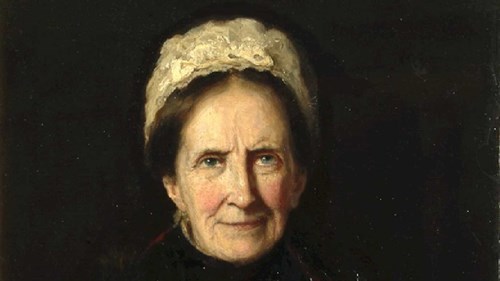
Miss Anna Swanwick (1813-1899) by Katherine Bruce [P1626]
Royal Holloway Art Collections
Scholarship
It would be remiss to discuss Anna Swanwick’s dedication to advance women’s education without first acknowledging her own impressive scholarship. By the time she was thirty, Swanwick had published Selections From The Dramas of Goethe and Schiller, a volume of translations, in 1843. She continued translating works such as Schiller’s Die Jungfrau von Orleans (The Maid of Orleans) in 1847 and Goethe’s Faust in 1850, both now considered classical canon of Western literature. A prolific translator of Greek classics, Swanwick’s translation of the eminent Aeschylus trilogy – notoriously challenging for any translator – was published in 1865, receiving glowing reviews. The Saturday Reviler commented: “...Here is fit cause for the advocates of the rights of women to gather together and chant a paean in commemoration of their advanced prospects and position” (attributed to Rev. P.H. Wicksteed in Bruce, 1903:88). Swanwick’s translation of the Trilogy was called “...The only perfect specimen in existence” in Henrietta Busk’s obituary to Swanwick in Bedford College Magazine (Busk, 1899:3). After the release of a fourth edition in 1884 – which she considered her completed work after a series of revisions – Dr. Butler wrote in 1902: “Miss Swanwick was convinced, or rather felt in every fibre of her being, that the poetry of a people was the real clue to its religion, to its ideals, to its working principles and maxims, and she was never wearied of getting ...to the historical root of this poetry.” (Bruce, 1903:113-114).
Teaching and Contributions to Women’s Education
From c.1847 onwards, even as she was fully engrossed in her literary work, Anna Swanwick provided free lessons to underprivileged children in her home on Woburn Street, London, where she had lived with her mother and sister Catherine since 1838 (her father John died in 1829). On what her niece Mary would call “errands of mercy,” (Bruce 1903:47), Anna would occasionally visit the area of Tottenham Court Road and identify poverty-stricken young girls, whose families could not afford to send to school, then persuaded the parents to allow these girls to join her classes twice weekly. As the reputation for her classes spread and pupil numbers grew, Swanwick and some of her friends rented larger premises: first, in a since-demolished building called the Colonade, then on to a premises on Newman Street, bringing together “...Young women from neighbouring shops for social gatherings involving reading and poetry recitation” (Bruce, 1903:47). Dr. James Martineau later incorporated these girls’ classes under the auspices of the Portland British Schools, which he had raised funds to establish. Under this scheme, Swanwick also went on to teach boys’ classes in the evenings and on Sundays.
Bedford College and Beyond
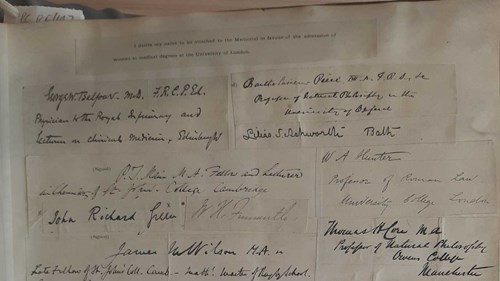
[Image: A petition in favour of admitting women to take medical degree examinations at the University of London, signed by Anna Swanwick, presented in 1877 to the Chancellor and Senate of the University of London].
Anna Swanwick’s profound and abiding dedication to girls’ and women’s education was not only a direct result of her gratitude for receiving a comprehensive education in Berlin with Prof. Zumpt but also, like Elizabeth Jesser Reid, of her discontent with the lack of access to education for girls and women in Victorian England (Bruce, 1903:33).
Swanwick played a prominent role in the establishment of Bedford College. A close friend of Elizabeth Jesser Reid, Swanwick and her mother were among the first group of Lady Visitors, whose members constituted the original Ladies’ Committee (a governing body) from 1849 at Bedford College for Women alongside figures such as Lady Romilly, Jane Martineau, and Eliza Bostock. She later became the first President of the Bedford College Suffrage Association (Busk, 1899:4). Notably, Swanwick was the first woman to be appointed to the post of Visitor of the College in 1884 for five years, a senior role which saw Swanwick preside over meetings between the Council and the staff, and carried the power to elect Members of the College (from whom, in turn, the governing Council could be elected. Tuke, 1939). Championing women’s education throughout the course of her life, Swanwick also served as a Lady Visitor at Queen’s College (founded in 1849), assisted with women’s classes at King’s College, and gave generously to the foundations for Girton College, Cambridge and Somerville Hall, Oxford (Busk, 1899). Meanwhile, Swanwick remained an eager student: with her mother and sister Catherine, Anna was amongst the first of 42 students to enrol at Bedford College for Women in 1848, to encourage other young women to enrol (Tuke, 1939 and Bruce 1903:52). Anna Swanwick attended lectures in Mathematics led by Prof. Newton, with whom she built a lasting friendship for more than fifty years. Acknowledging Swanwick’s outstanding contribution to literature, University of Aberdeen bestowed her with an honorary LLD (Doctor of Laws) degree on April 7th, 1899, only a few months before her death.
Abolition, Suffrage, and Women’s Rights
In addition to advocating for women’s education, Anna Swanwick took up the mantle of a range of social causes. She attended the World Anti-Slavery Convention in London in June 1840, whereby the events that took place left an indelible impression upon her. A group of working women, having left their families and jobs behind to travel 4000 miles from Massachusetts, U.S.A. to join the convention in protest against slavery, were refused entry – simply on account of being women!
“One speaker argued that it would be ‘subversive of the principles and traditions of the country and contrary to the Word of God’ if women were allowed to sit in conclave with men. They might sit in the gallery and listen, but for women to speak in public was shocking bad taste, and could never be allowed!” (Bruce, 1903:158).
This injustice ignited Anna’s zeal to push for the political enfranchisement of women. Alongside Emily Davies and Barbara Bodichon (co-founders of Girton College), Swanwick was part of the Kensington Society (1865-1868) who met to discuss issues relating to the improvement of women’s rights. The society exerted pressure on the government by collecting and delivering a petition with 1521 signatures to Parliament on 7 June 1866, demanding women’s suffrage.
At a Women’s Suffrage Movement address presided over by Sir Robert Anstruther M.P. in 1873, Anna Swanwick stunned attendees with an impromptu public speech. According to writer and philosopher Frances Power Cobbe, a friend of Swanwick’s, leaders of the Women’s Suffrage Movement made efforts to publicise Swanwick’s attendance at the address as widely as possible given her status as a literary scholar. Power Cobbe and The Women’s Suffrage Movement expected Swanwick to deliver a brief statement of endorsement to support the cause for suffrage, yet Swanwick exceeded all expectations:
“...Her speech was crammed with ideas...I questioned whether any other speaker...without the smallest experience of public oratory, ever achieved such a success.” (Bruce, 1903:160-161).
Swanwick concluded her speech with the following words:
“On the battlefield of life, where the powers of evil and of good are arrayed for mortal combat, the forces which are needed are not physical but spiritual forces; not powerful limbs, but hearts and brains; and in these women are not deficient. Give them a sound, practical education, remove their social and political disabilities, and in their energy and sympathy, conscientiousness and tenderness we shall, I believe, have a reservoir of power which will lift this great nation to a higher level of social and political life.” (Printed in the Birmingham Daily Post; Bruce 1903:159-162).
In the mid-1800s, women had no right to legally own their own property, or to claim parental rights over their children in a last will and testament. The inequality between laws for men and women moved Anna Swanwick to act for change, and she spoke publicly on women’s suffrage on a number of occasions thereafter (Bruce 1904:164). During her lifetime, Anna lived to see the Married Women’s Property Act passed in 1882, and the Guardianship of Infants Act passed in 1886.
Personal Connections and Intellectual Pursuits
Swanwick was a forward thinker with a curiosity for a wide range of subjects, ever keen to keep up with current developments, theory, and discovery in politics, science, religion and literature (Bruce, 1903:116). In 1858, Anna was elected to be the first female member of the Royal Institution, and was a keen attendant of their Friday evening lectures. She was especially interested in Darwinian theory in development at that time.
Swanwick held a reputation for being a skilled debater due to her wide-ranging knowledge and interests, and her ability to present ideas with logical and lexical precision (Bruce, 1903). These skills were in demand beyond her private teaching and literary scholarship: in 1875, Anna Swanwick was invited to deliver a Sunday evening lecture on literature at South Place, Finsbury, by an “influential committee” formed of figures such as Thomas Henry Huxley, and Sir John Lubbock, (Bruce, 1903:182). This reference potentially holds a connection to the activities of the X Club, a gentleman’s dining club established by Huxley in 1864, to discuss theories of natural selection without theological implication (amongst other scientific endeavours).
Recollections of Anna Swanwick by close personal friends reveal her character as a quietly confident, charming woman who could command attention by her expansive intellect and empathetic nature. Swanwick’s enthusiasm to engage others in conversation on a wide range of subjects drew a large network of friends and acquaintances, whom she entertained at her noted salons and dinner parties: Robert Browning was a frequent guest (Bruce, 1903:130) and in 1881, Swanwick was elected Vice-President of the Browning Society (1881-1891). Swanwick was also a good friend of Prime Minister William Gladstone (Bruce, 1903:118-119), and was a frequent dinner guest at the home of Lord and Lady Tennyson (Bruce 1903:126).
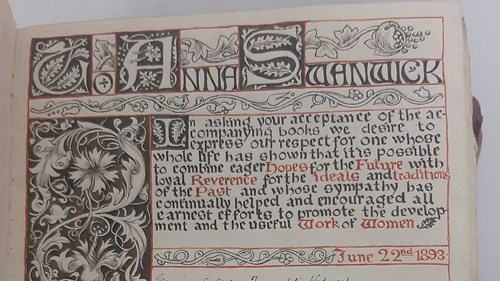
[Image: a written dedication to Anna Swanwick bearing the following inscription on the flyleaf of a copy of The Recuyell of the Historyes of Troye (1892), held within the Archives and Special Collection Rare Books section at Royal Holloway, University of London:
“...We desire to express our respect for one whose life has shown that it is possible to combine eager hopes for the future with loyal reverence for the past, and whose sympathy has continually helped and encouraged all earnest efforts to promote the development of the useful work of women.”
Dated 22 June 1893, this copy of The History of Troye was presented to Swanwick on her 80th birthday in 1893 alongside five additional volumes of other works, signed by 35 women].
The trajectory of Anna Swanwick’s long and active life observed a seismic realignment of 19th century reform, whereby some of her greatest hopes were realised: university access for women to study formal degrees, law changes in favour of women’s property and parental rights, and the establishment of Morley College for Working Men and Women in 1889, which enrolled over 800 working-class students. These achievements were the fruits of the labour of courageous people like Anna Swanwick throughout the mid to late 19th century. Illuminating the story of Anna Swanwick’s exceptional achievements and dedication to social causes can continue to inspire those who strive for a more equitable society.
Laura Spence, Archives Assistant (Doctoral Placement) and PhD Student, Ethnomusicology.
Bibliography
Barton, R. (1998). “Huxley, Lubbock, and Half a Dozen Others”: Professionals and Gentlemen in the Formation of the X Club, 1851-1864. Isis, 89(3), 410–444. http://www.jstor.org/stable/237141
Bruce, M.L. (1903). Anna Swanwick: A Memoir and Recollections 1813-1899. London: T.F. Unwin.
Bedford College Magazine. (December, 1899, No.40). BC AS/200-209, Archives and Special Collections, Royal Holloway, University of London.
Cassells Family Magazine. (1875). Education in Queen’s College, London. Retrieved from Victorian Voices.net, CFM1875-QueensCollege.pdf (victorianvoices.net).
Collection of Autograph Signatures in Favour of Admitting Women to Medical Degrees. (1877). BC RF/147, Archives and Special Collections, Royal Holloway, University of London.
Le Fevre, R. and Caxton, W. (1892). The Recuyell of the Historyes of Troye. Hammersmith, London: Kelmscott.
Girton College, Cambridge. (2021). Exhibition: Tributes to Emily Davies. Retrieved from Tributes to Emily Davies | Girton College (cam.ac.uk).
Tuke, Margaret J. (1939). A History of Bedford College for Women, 1849-1937. London: Oxford University Press.










